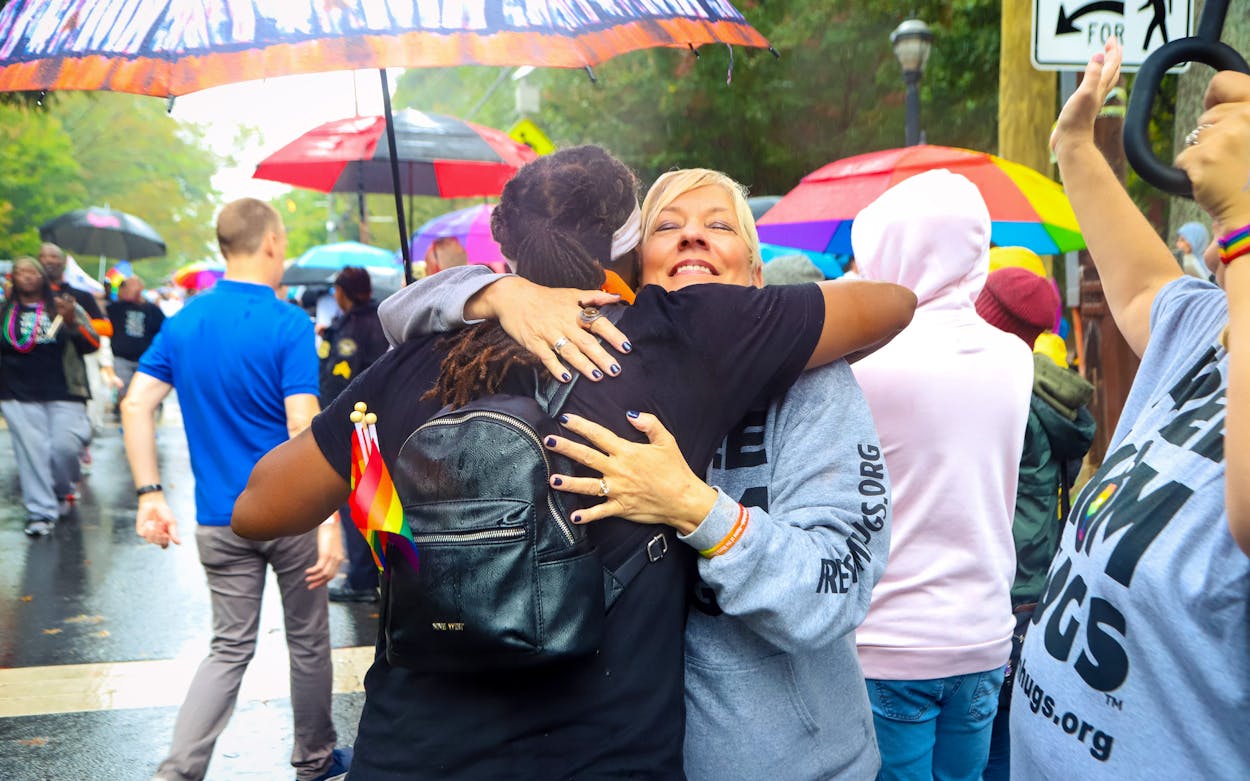Kai Shappley, a Pearland native who now lives in Austin, is the inspiration for the feature length documentary, Mama Bears, which premiered at South by Southwest on March 13. Now just eleven years old, Kai became a nationally recognized activist five years ago after she and her conservative Christian mother, Kimberly Shappley, began challenging legislation targeting trans people in Texas. In 2017, she appeared at the Texas Capitol sitting on her mother’s lap while her mother testified against SB 91, a bill that aimed to prevent transgender people from using the restrooms that matched their gender identities. In 2021, Kai returned to the Capitol, this time to testify by herself against SB 1311 and SB 1646, which aimed to criminalize gender-affirming medical treatment for trans children and classify it as “child abuse.”
Their activism caught the attention of filmmaker Daresha Kyi, who was commissioned by the ACLU to direct a short documentary about Kai and Kimberly, Trans in America: Texas Strong. The film won an Emmy for Outstanding Short Documentary and through Kimberly, Kyi learned of the Facebook group Mama Bears, which serves as a space for mothers of LGBTQ children. Kyi began expanding the short on Kai into a feature that includes two other devoutly Christian families in the group.
In Oklahoma, we meet Sara Cunningham, a mother who spent days in bed, shocked after her son, Parker, came out to her when he was 21 years old. And in California, Tenita Lewis Artry still struggles to accept that her adult daughter, Tammi Terrell Morris, is a lesbian. Mama Bears takes a thoughtful look at the relationships between Kai, Parker, and Tammi and their mothers as they reconcile their faith with their love for their LGBTQ children.
Read More: Is It Illegal to Have a Transgender Child in Texas?
Although the film depicts a community of mothers excited to have found others who are on similar journeys, the group seems to provide only a tenuous connection between the families at the heart of the documentary. Sara, Parker’s mother, appears to be the group’s most active participant, attending Mama Bears meetups and Pride marches and even starting Free Mom Hugs, a LGBTQ advocacy nonprofit. It’s unclear whether Tammi’s mother is a member of Mama Bears, but it seems unlikely because a little more than halfway through the documentary, we’re informed that Tenita has decided to stop participating in filming. Finding the Mama Bears group helps Tammi better understand her own mother, but more important, it leads her to the Reformation Project, an organization that promotes LGBTQ inclusion in churches. For her part, Kimberly shares with the Facebook group how her last church “tried to cast demons out of” Kai and asks other members for prayer and “guidance to make wise choices to raise [Kai] well.” But other than that, the film doesn’t spend much time delving into Kimberly’s relationship with Mama Bears, either.
While the Mama Bears connection feels slightly contrived, the documentary is nonetheless powerful when it explores each character’s understanding of gender, sexuality, and Christianity. Parker talks about how he would read the Bible searching for verses that affirmed him, only to come away feeling as if “God’s love does have a limit.” Tammi grew up in a community that believed a person couldn’t be openly gay and a Christian, and she even recounts how after her nephew died on her birthday, a relative essentially blamed his death on her sexuality. The experience was so traumatic it drove Tammi back into the closet and into a marriage with a man. Ultimately, Kimberly’s and Sara’s love for their children led them to new understandings of Christianity. “The truth is that Kai has made me a better Christian,” Kimberly says.
There are quiet and triumphant, if bittersweet, conclusions to Parker and Tammi’s stories in the film. Parker now accompanies his mom on tours for Free Mom Hugs. And although Tenita disappears from the documentary, Tammi insists that her mother still loves and supports her. Plus, after decades of denying her own sexuality, Tammi is openly in a relationship with a woman. But Kai’s story is a bit more complicated. As a trans girl under eighteen living in Texas, she faces different challenges than Parker and Tammi.
The Shappleys spend most of the documentary fighting against 2017’s bathroom bills, after the Pearland ISD superintendent testified in support of them and Kai’s school preemptively enforced them, outing her as a trans girl and restricting her to the bathroom in the nurse’s office. The last few scenes with Kai include a visit from the late Monica Roberts, a Black transgender journalist from Houston who ran the blog TransGriot. Kai knows her simply as “Aunt Monica.” Roberts died in 2020, but she left behind a legacy of Black and trans activism. During her visit with the Shappleys, she offers words of encouragement to a weary Kimberly. “It’s only going to get better, we are going to win,” Roberts says. “This is a rough patch that we’re going through right now, but I really and truly believe that we are on the correct side of human history, and we will win this.”
Her prophecy about the bathroom bills eventually proved true; the bills failed. And so did the 2021 bills seeking to classify gender-affirming medical care for trans children as child abuse. But the ideas behind those 2021 bills live on: earlier this year, an opinion from Attorney General Ken Paxton spurred a letter from Texas governor Greg Abbott directing the Department of Family and Protective Services to investigate parents of trans children for child abuse. And there are at least a few hundred anti-trans bills under consideration across the country. Roberts’s words offer a timeless beacon of hope for Kai, Kimberly, and families like theirs, but one can’t help but wonder just how many rough patches they’ll have to weather.
- More About:
- Politics & Policy
- Film & TV
- Documentary








